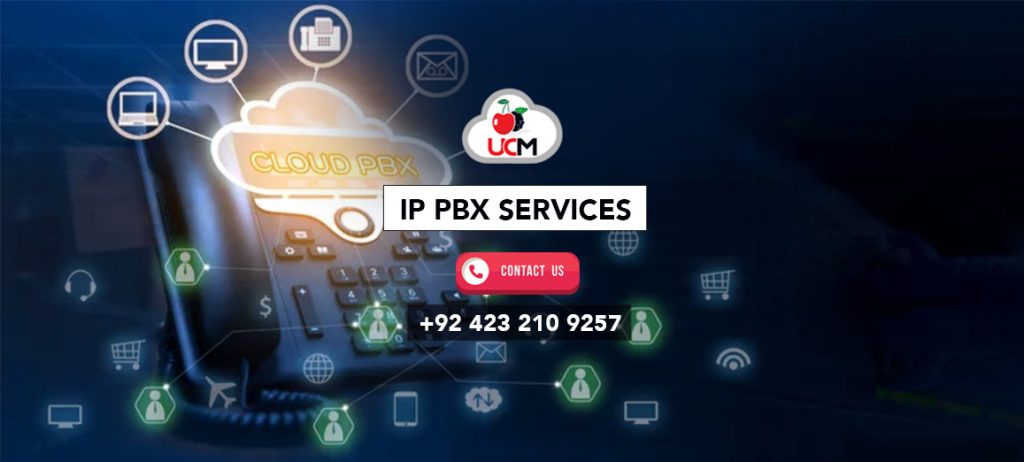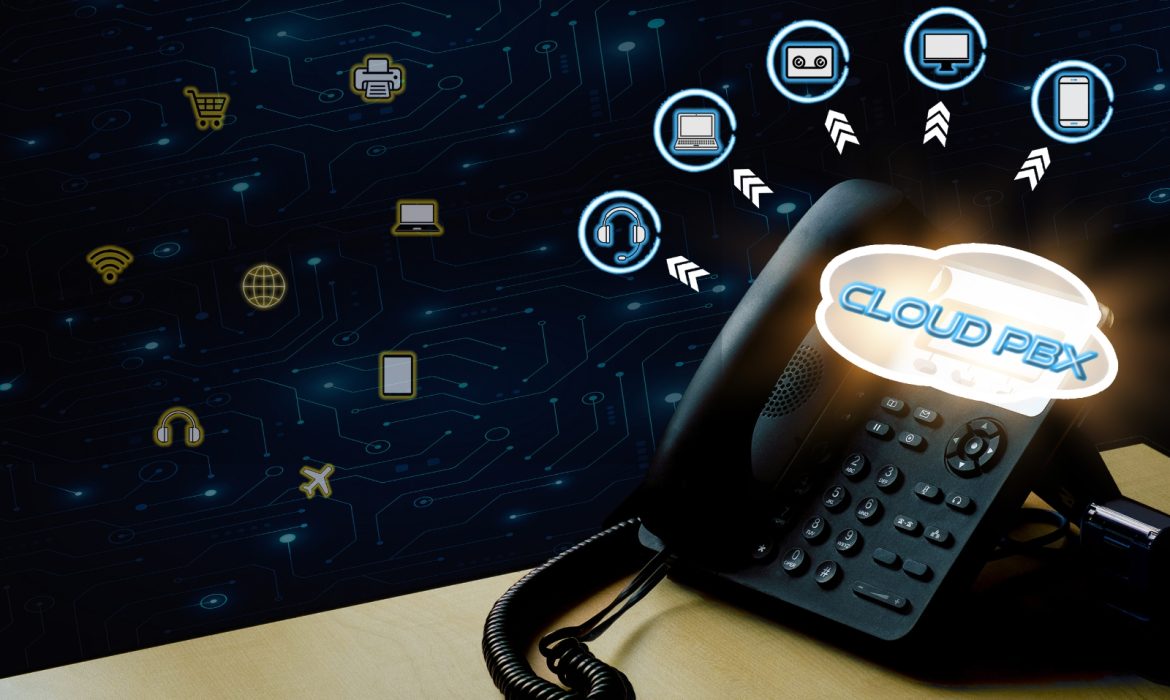Why is The IP PBX System Future For Business?
Why Do You Need an IP PBX System For Your Business Communication?
Every business evolves, grows and expands over time and never stands still so do your customer expectations. Effective internal and external communication is paramount to keep your business on the fast pace of progress, which is possible with the fusion of advanced technology, operational excellence and futuristic charm. Enter the IP PBX System as a game-changing technology that has come a long way from traditional PBX systems in terms of better connectivity and functionality due to integration with artificial intelligence. Let’s dive deep into the benefits and importance of IP solutions for remote teams and how they can future-proof your business.
A Journey to the Evolution of Business Phone Systems
1. Landlines as Foundation of Business Communication: Earlier, landline phone systems were used for business communication that provided limited features and functionality. They were considered reliable means for incoming and outgoing voice communication within a fixed location to connect with customers and partners.
2. The Advent of PBX Systems: As technology continues to evolve, traditional PBX systems come into the market as a better alternative to landlines. Companies can manage multiple lines and incorporate extensions easily with these systems. Your agents get the potential to forward calls or send/receive voicemails. It was the first step towards customised and flexible business tools.
3. Smartphone, Internet & VoIP Revolution: The arrival of the internet and mobile technology proved a game changer with business communication no longer constrained to desk phones. Your teams can collaborate virtually from whenever, wherever required through internet access leading to increased productivity and efficiency. Moreover, smartphones revolutionise business interactions by bringing email and other apps to the palm of your hand.
4. AI & IoT Integration: The future of communication is promising with the integration of artificial intelligence and the Internet of Things. IoT-based communication devices and AI-enabled virtual assistants will make business interactions more efficient and intuitive.
Understanding The Basics of IP PBX System
For years, PBX (private branch exchanged systems have served as internal business telephone systems to manage incoming and outgoing business calls. The latest IP (Internet protocol) telephony has replaced the traditional systems that allow establishing calls over the Internet connection. The main aim of IP systems is the management of the incoming and outgoing call traffic of a business. Meanwhile, VoIP solutions have made communication easier and streamlined. Moreover, businesses using IP technology can manage voice calls and other VoIP communication channels through a single network supporting better flexibility, scalability and agility.
Which Type of IP IPX is Suitable for a Business?
Making the right choice while moving from traditional legacy systems can be challenging for businesses. On-premises and cloud IP PBX are two common systems in practice that are descendants of legacy systems.
1. Analog PBX: Traditional or legacy PBX are the oldest known PBX systems that need physical equipment and are housed on-premises. They operate through copper-based telephone lines connected with a PBX box and kept in the office building. Analog systems are considered outdated today because they offer fewer features and integrations than the latest VoIP and cloud-based systems. Moreover, the PBX box contains a telephone switchboard that allows your team to communicate by connecting phones and interface between PSTN lines and private networks.
2. On-premises IP PBX: This IP system is placed in your office premises and can utilise an existing internal network and internet connection. It contains more advanced features than legacy PBX systems like call routing, IVR, conferencing, video calling and more. Meanwhile, the on-premises system works best when integrated with SIP trucks offering better resilience and more stable sound quality.
3. Cloud PBX: Virtual PBX is a digital system managed by a service provider and hosted in the cloud. A hosted or cloud PBX runs over an internet connection and benefits from PBX system functionality. This system offers more scalability and flexibility for businesses. Thus, they can integrate their phone systems with business CRM to make processes more efficient. In addition, it serves as a unified communication platform to streamline business communication processes.
Why Switch to Cloud-Based IP Systems? Top Reasons
Moving to a VoIP PBX system is wise for businesses looking to reduce their communication costs. These latest systems offer better reliability and allow you to go global or scale considering your business needs. Let’s learn about some important reasons that might convince you to switch.
1. An Easy-to-Use & Manageable System
Whether choosing an on-premises or cloud-based IP PBX, the system is managed through a web-based dashboard. It also means that you should not need to worry about maintenance, customisation and upgradation because the service provider is responsible for all this. This saves significant costs and time for your teams.
2. Quick to Deploy & Install
The IP system runs as software so you can install it more quickly and use it instantly. Your teams with initial IT knowledge can install the system and save time spent on hiring IT professionals. As this system works through the Internet, the cost of long-distance and international calls also lowers.
3. Allow Scaling Up & Down
Scaling is difficult in legacy systems while easier in cloud-based VoIP systems. Small businesses and established enterprises can invest in the system to stay dynamic. They can add extensions and phones according to their business needs and provide a friction-free experience to their customers.
4. Support Remote Working
The latest VoIP systems make your sales and marketing agents more efficient and productive. They can deliver a more seamless customer service experience through this unified communication system. Many service providers offer softphones and applications for mobile devices that enable your remote workforce to stay connected with customers and team members from anywhere. This also fosters a collaborative environment and keeps all your teams on the same page.
Final Thoughts: Make the Move
Indeed, a cloud-based IP PBX System has become a solution of choice for businesses today to manage incoming and outgoing calls. These systems have come a long way from legacy and wired systems as the evolution of the internet and the integration of AI has increased their efficiency. Businesses can keep their teams together, manage internal and external communication beyond office boundaries and improve business connectivity. In addition, these secure, flexible, futuristic and scalable solutions have made relocation easy as nothing needs to move during the process. Are you looking to switch from a legacy system to the latest cloud PBX? Contact CherryBerry UCM right away for expert assistance to grow and expand easily.
Manual Dialling vs Auto Dialer Solution: Which is Better & Why?
How Does An Auto Dialer Solution Add Efficiency to Your Outbound Campaigns?
Today, every second counts in the sales process as time is money. Your sales and marketing teams must reach maximum leads to achieve their sales targets. For this, they battle constantly against the clock. The major reason that lowers your agent’s speed and talk time is the idle time between calls during manual dialling. Thankfully, the latest Auto Dialer Solution can make your agents more efficient and productive increasing their talk time by 200-300%. For this reason, the dialling method you choose plays a great role in making your outbound campaign successful. Let’s learn how technological advancements and the integration of AI in the latest dialling solutions have made it a norm in the call centre industry.
What is Manual Dialling in Call Centres?
Over the years, call centre agents have used manual dialers to contact leads and prospects. They dial numbers manually from the provided list one by one. Most small to medium call centres even start their business from traditional dialers and they are still in practice in many areas. Your sales or marketing agent has to wait for the call to connect which can also be wrong, busy or reach voicemail or answering machine. Moreover, manual dialling cannot filter calls therefore it is a less efficient option to manage outbound campaigns.
Understanding Auto Dialer Solution
Now you have guessed that auto dialer is a software that automates the entire dialling process. It is an efficient way to establish connections with leads and customers in outbound call centres. These dialers dial contact numbers from the provided list automatically and connect agents to live calls. It also means these dialers can skip unproductive numbers, busy tones and answering machines. This increases your agent’ talk time and boosts their efficiency. They can spend more time establishing relations with existing customers and converting leads. Hence, your business efficiency, performance and ROI depend on the dialer and its characteristics.
Reasons Why Auto Dialer Software is a Better Option for Call Centres?
1. Support Dialling Process
Manual dialling requires agent efforts to initiate outbound calls. This method gives them control over their sales and marketing campaigns. Conversely, auto-dialers are available in the market in many modes, they support progressive, preview and predictive dialling. Meanwhile, agents can also easily switch between different dialling modes considering the needs of marketing campaigns.
2. Provide Access to Customer Information
Your sales and marketing agents need to access customer information from a computer or paper record in manual dialling. The process also involves extra time and effort for your agent to decide which customers to be contacted first. However, contact numbers are stored in the database of auto dialer software which the system dials automatically in sequence. Your agents can access and preview customer information on their screens before and during calls to manage complex interactions efficiently.
3. Handle Large Call Volume
Modern call centres cannot rely on manual dialers to manage a large number of outbound sales calls. Your agents can hardly handle a high volume of calls by dialling manually. Auto dialers help call centres in managing large-scale sales and marketing campaigns. For instance, predictive dialers can determine when your agent will be free to take the next call lowering the idle time between subsequent calls. In addition, the progressive dialer dials the next number immediately as the agent wraps the previous call.
4. Improves Agent Productivity
Your agent dials all numbers manually and waits for the call to connect with a live person in the manual method. Conversely, cloud-hosted auto-dialers contain voice detection technology to detect answering machines. Thus, the system transfers only live calls to agents and enables them to manage the surge in outgoing calls efficiently. Meanwhile, CRM integration allows viewing of customer information and offering personalised interactions.
Things to Consider While Choosing the Right Dialer for Your Business
1. Size of Sales & Marketing Teams
If your call centre consists of large sales and marketing teams, an Auto Dialer Solution is the best option to enhance efficiency. Likewise, these solutions also allow scaling up or down so you can grow and expand easily. However, manual dialling saves significant costs and ensures more personalised services during sales interaction if you are a startup or have a small sales team.
2. Target Audience
It is important to consider your target market and the level of personalisation needed during sales interactions. For instance, manual dialling is a suitable option if you aim to develop strong business relationships. In the case of a less sensitive target audience to the personal touch that values efficiency and speed, auto-dialling solutions are the best choice.
3. Business Goals
The primary goal of many businesses is to increase efficiency and streamline the sales process. They can achieve their business goals through auto-dialer technology. Similarly, some companies value meaningful customer relationships through personalised services. Manual dialling is suitable for such companies.
4. Budget
Before investing, companies should evaluate their budget and auto-dialer cost. This is because they require higher investment to improve efficiency, productivity and return on investment (ROI). Meanwhile, manual dialers are low-cost solutions.
5. Integration with Other Systems
Integration with manual dialling is difficult but possible. You should go for auto-dialling software that can easily integrate with your existing sales and marketing tools. For instance, CRM integration provides your teams access to updated customer information which they can use to deal with personal touch. It enhances the overall efficiency of your sales and marketing process and makes lead management and performance tracking easier.
Exploring the Sectors Where Cloud-Based Auto Dialers are Doing Wonders
Cloud-based dialers are an efficient way to strengthen the communication between customers and the company. The service-oriented businesses can leverage the potential of this technology to reach the maximum number of customers and automate appointments and reminders. They can convert leads into paying customers through personalised interactions using different dialling modes. Following are the common industries leveraging the power of auto-dialers.
- Travel and Tourism Industry
- Telemarketing Industry
- Banking & Finance Sector
- Debt Collection Agencies
- Insurance Companies
- Automotive Industry
- Healthcare Sector
- Political Parties
- Hospitality Industry
Closing Thoughts
Indeed, the Auto Dialer Solution has transformed how your sales and marketing teams manage interactions with leads and prospects. These solutions enable them to reach maximum prospects increasing the chances to convert through increased talk time and avoiding unproductive numbers. The selection of the right dialling solution is highly critical to making your outbound sales and marketing campaigns successful. Thus, if you are looking for assistance in choosing the right dialer for your business, don’t forget to reach CherryBerry UCM for expert guidance.
What are the Advantages of Cloud-Based Call Center Solutions?
Why Modern Businesses Need Cloud-Based Call Center Solutions?
How can you run successful sales and marketing initiatives, manage the large influx of inbound traffic and improve customer service experience? Do you need help with several challenges as traditional call centre setup hinders business growth and expansion? If so consider transitioning to Cloud-Based Call Center Solutions to enhance your business communication, widen your outreach, keep customers satisfied and improve ROI. Switching to online solutions allows integration with other tools and apps that streamline overall business operations and increase your team’s performance. Here is how advanced solutions can put your business on the fast track to growth.
What are Cloud-Based Call Center Solutions?
As the name implies, the entire call centre infrastructure is managed and hosted through a cloud other than a traditional hardwired telephone system. These web-based solutions allow your customer service, support, sales and marketing teams to receive and initiate calls through the internet. Cloud-based call centres are not restricted to any place or only one server. The cloud facility makes all features available for your in-house and remote teams regardless of physical location. Meanwhile, the latest voice-over-internet-protocol (VoIP) phone systems streamline customer interactions through advanced integrations. It also means businesses can provide more customer-friendly and efficient service.
How Are Cloud Solutions Better Choice Than On-Premises Solutions?
On-premises solutions need regular and costly upgrades including established networks, IT experts, servers, integration support and hardware. This is why these traditional systems are hard to manage due to initial expenses while a dedicated office space is also required for servers. Likewise, there is a need to upgrade these systems within 5-10 years due to technological advancements. Conversely, cloud-based call centres are low-cost solutions that manage everything online without physical hardware. Your cloud service provider is responsible for maintenance and upgrades while you can easily scale and grow with your business needs.
What are the Essential Features of Cloud Software?
1. Call Routing: This call centre software feature automatically routes incoming customer calls to the most appropriate agents reducing long wait times and enhancing efficiency.
2. Automatic Call Distribution: Call centres can distribute calls evenly among customer service, support, sales and marketing teams to increase performance and timely response.
3. Caller ID: Teams can identify the callers and get their contact information through this feature. It helps them to offer personalised interaction.
4. Reporting & Analytics: Businesses can track their call centre and agents’ performance through data analytics. They can use these insights to identify coaching needs and improve services.
5. Integrations: Cloud software allows integration with other tools like CRM systems. This integration supports your agent during complex interactions and boosts conversions.
6. Speech Analytics: Call centre administration can analyse the calls between agents and customers. It helps them to judge customer satisfaction levels and boost positive improvements.
7. Omnichannel Communication: Companies can interact with their customers in their preferred mode of communication to reach customers efficiently. Cloud technology in integration with CRM software stores all customer interaction data in one place to make things easier for your teams.
How Cloud-Based Solutions Are Beneficial For Your Business?
1. Offer Greater Scalability
Cloud-based Call Center Solutions allow businesses to easily scale up and down considering their fluctuating and seasonal incoming and outgoing call needs. They can do it without paying extra costs for installing complicated software or purchasing other hardware.
2. Less Expensive Solutions
It is important to note that on-premises call centre systems require significant costs for setup and maintenance. They also have to invest in advanced expensive technology, infrastructure and software. The latest cloud solutions allow integrations with different business tools and applications. This is why cloud solutions are cost-efficient solutions for businesses with tighter budgets.
3. Ensure Security & Reliability
Another perk of cloud-based call centres is their round-the-clock availability. Call centre administration and teams with credentials can access business data whenever, and wherever required. These reliable solutions store data in the cloud ensuring advanced security against malware and data breaches. Your data remains secure and accessible even during disasters and emergencies.
4. Enhance Customer Service Experience
Customers value businesses that quickly resolve their problems. Integrating the cloud with other systems and tools like CRM systems gives your agents access to all data. They can use this data to offer personalised services and resolve customer issues across multiple channels.
5. Improves Omnichannel Interaction
The latest solutions allow call centres to offer communication on several platforms rather than just mere calling. Meanwhile, your teams can also handle communication easily making the cloud systems more beneficial than their on-premises counterparts.
6. Facilitate Remote Work
Businesses can employ remote teams from a global talent pool to improve the quality of their services. Your agents can access all tools from anywhere and communicate with in-house teams to boost collaboration. They just need an internet-connected device to do their job efficiently.
What Else to Expect From Call Centre Software?
7. Reduces IT Needs
Advanced cloud solutions do not rely on on-premises servers or hardware therefore no IT maintenance is required. This frees up your teams’ time to invest in completing more important projects and focus on core business competencies. Your cloud service provider is responsible for security and upgrades.
8. Allow AI Integration
Your business data is stored in one or interconnected clouds. Companies can take advantage of machine learning and AI to automate processes and get useful insights. They can use predictive analytics to find out inefficiencies and future-proof their business. Moreover, you can also deploy new tools leveraging the potential of the cloud like chatbots, virtual assistants and more to streamline your communication process.
9. Provide Superior Disaster Recovery
There is a risk of data loss during power outages or natural disasters in on-site solutions. Thankfully, you can continue business operations with minimal disruptions using cloud solutions. They can also reduce the risk of downtime keeping their data secure in the cloud. Meanwhile, the absence of physical infrastructure and energy consumption reduces carbon footprints.
Wrapping Up: A Way Forward
Indeed, Cloud-Based Call Center Solutions are the future of customer service due to flexibility, scalability and cost-efficiency. These solutions are ideal ways to run your sales and marketing campaigns successfully and in line with future technological advancements. On top of that, they improve your internal and external business communication and expand our outreach. Are you considering transitioning from on-premises solutions to cloud-hosted platforms for excellence in customer service? Reach CherryBerry UCM for innovative solutions to outshine competitors!
How Can A Virtual Call Center Provider Support Business Growth?
What Makes A Virtual Call Center Provider Ideal For Businesses?
Nowadays, everything is moving to the virtual world and it is not surprising that call centres are also heading towards the same direction. Cloud-based solutions have made virtual work possible more than ever and streamlined call centre operations for everyone. Agent’s productivity has reached a new level while customers feel valued and supported. As technology continues to evolve, the need for a Virtual Call Center Provider is also gaining traction to keep up with industry trends and open doors for agent efficiency. Let’s explore the basics and benefits of virtual call centres for modern businesses.
Understanding the Significance of Virtual Call Centres
It is a customer service centre wherein customer support, sales and marketing agents work virtually from their desired locations. Your teams communicate with customers and co-agents using virtual solutions like email, phone, chat or social media. In recent years, virtual services have gained popularity due to flexibility, cost efficiency and scalability. They are the best ways to access the global talent pool to provide top-tier services to your customers. These services enable your agents to work from remote locations using cloud technology. Your virtual teams can access all the information your in-house teams have to communicate with customers.
How Does Virtual System Work?
Your remote agents have tools and technology to manage complaints, inquiries and other issues. They work conveniently from any location through a stable internet connection and device. Moreover, call centre agents can access call scripts, customer data and necessary information to offer efficient customer service through cloud-based virtual software. This software contains tools needed to streamline inbound and outbound call operations. Meanwhile, it also offers advanced features like IVR, call routing and recording to manage calls efficiently.
What A Virtual Call Center Provider Can Do For Your Business?
Virtual call centres gain popularity when companies have to move remote solutions for security reasons after COVID-19. According to research, remote work increases 90% of remote agent performance while 68% of talent prefer the work-from-home option. Virtual call centres don’t need to be physically situated in a place. Call centre administration can manage the following tasks remotely through their virtual teams.
1. Customer Support: The first responsibility of typical call centre agents is to address customer complaints and inquiries, offer assistance and resolve their issues. Call centre software makes things easier for your customers.
2. Technical Support: Virtual call centre agents also help customers manage technical issues like how to get the system back to normal or fix the product issue and more.
3. Order Processing: Many businesses like restaurants assist customers in order placement and processing. Virtual call centre agents guide customers on any step, they find challenging during the buying journey.
4. Upselling & Sales: These services also help businesses in sales activities. They make outbound calls to leads and prospects to address issues and promote product features.
5. Appointment & Reminders: Businesses can acquire call centre services to manage appointment schedules and reminders. Their agents can update customers’ schedules and send reminders to avoid no-shows.
6. Market Research: They can conduct surveys and market research for businesses looking for ways to collect valuable customer feedback for quality enhancements.
Do Virtual Call Centres Work Differently From Traditional Call Centres?
1. Location
The old call centre setup is located in a fixed physical location to manage routine inbound and outbound call centre operations. Conversely, no physical space is required for virtual call centres that employ geographically dispersed agents and professionals.
2. Infrastructure
On-premises call centres need set-up, equipment and infrastructure to facilitate in-house customer service and sales and marketing teams. However, no such hassle is required in virtual call centres that rely on cloud centre technology to manage call centre operations.
3. Scalability
Virtual call centres are also different from traditional call centres based on scalability. On-site call centres have limited space and resources which makes the scaling difficult. On the other hand, cloud-based virtual call centres are easy to scale up and down with your fluctuating needs.
4. Agent Availability
Traditional call centre setup allows employing agents only from local talent. Your in-house teams are restricted to work from a physical office location. Meanwhile, cloud-based call centres enable companies to access the global talent pool and employ the best agents for enhanced customer service and outshine competitors.
5. Operating Hours
Companies can always keep their operations functional with the flexibility offered by cloud software. They can hire agents from different time zones for the round-the-clock service. Typical call centres have fixed operating hours.
6. Cost
Cloud-based virtual call centres require lower setup, maintenance and operational costs. Your virtual call centre service provider is responsible for maintenance and upgrades. However, you need higher setup, operational and maintenance for the on-premises call centre.
7. Technology Adaptation
Advanced virtual calling services have the latest features and tools to streamline communication with today’s tech-savvy generation. The old call centre requires significant tech updates, upgrades and maintenance.
Why Virtual Services are the Best Option for Your Business?
1. Expansion of Business Hours
Businesses that have customers all over the globe do not need to establish an office worldwide. Instead, they can provide better customer service experience on a global level through virtual solutions and drive revenue and sales for their business.
2. Reduce Overhead Costs
Maintaining a virtual workforce is less costly than operating in a physical office. Virtual providers are responsible for the maintenance and upgrades of cloud solutions so companies do not have to invest in hardware and infrastructure. Meanwhile, your data also remains safe in case of disasters.
3. Streamline Management & Monitoring
Call centre management no longer needs to check agent performance physically. They can monitor and track their call centre and teams’ performance through analytics, reporting and dashboards. This facility is hard to imagine with the traditional setup.
4. Improves Collaboration & Customer Service
Virtual solutions enable companies to communicate with their customers across multiple communication channels. This omnichannel customer service experience increases customer loyalty and satisfaction. Meanwhile, the systems also allow your remote teams to collaborate and stay on the same page about customer service.
5. Provide Access to a Global Talent Pool
Virtual call centres can employ agents and professionals globally and in different time zones. By choosing the most qualified experts in the field, they can easily achieve their sales and productivity goals.
Closing Thoughts
Ultimately, virtual call centres have emerged as an efficient solution to delivering top-notch customer service experiences and enhancing the customer journey. Modern businesses struggling to streamline their business operations can achieve scalability and the maintenance costs challenges by taking support from a Virtual Call Center Provider. This way, they can reach new heights of efficiency by providing the necessary tools to your agents. Ready to switch to the virtual world to provide next-level efficiency? Contact CherryBerry UCM for expert assistance and business growth.
Is Automated Outbound Calling the Future of Customer Outreach?
Importance of Automated Outbound Calling System
Significant transformations in customer outreach are compelling businesses to look for innovative outreach strategies to connect with potential and existing customers. Outbound calling has become an essential practice gaining prominence to reach customers easily. It enables businesses to proactively initiate outbound calls to customers, clients and potential leads to achieve their sales and marketing goals. However, manual handling of outbound calls lowers your sales reps’ speed, increases the idle time and reduces operational efficiency. Thankfully, Automated Outbound Calling solutions have changed how your agents interact with customers and clients to turn your outbound campaigns into successful ventures.
What is Automated Outbound Calling?
Outbound agents make calls to accomplish specific goals like delivering information, promoting products, or capturing customer feedback. Making an outbound call can drain your agent’s energy, especially in the case of manual dialling. They even have to report why certain calls are not answered. Automating the dialling process of outbound calls makes things a little easier. Moreover, auto-dialers can detect busy signals and unproductive numbers so hang up such calls and move to the next number. Automated auto-dialers are valuable tools for customer support, sales and telemarketing teams to save time and resources.
Why Businesses Need to Automate Outbound Calls?
Automated solutions enable businesses to use their resources in a better way. They are leveraging the technology for greater operational efficiency, better caller experience and improving their sales and marketing teams’ performance. Manual dialling methods slow down your lead conversion ratio when your agents waste time dialling each number or experiencing busy tones. Automated dialers connect agents with live calls that speed up lead conversion rate. They are also cost-efficient and scalable solutions that allow targeted and data-driven marketing and put your business on the fast track of growth.
What are the Important Use Cases of Automated Dialers?
Suppose the scenario teams reach customers with tailored and timely messages that make them feel valued. The latest automated solutions allow your teams to communicate with leads and customers with the efficiency traditional methods can’t provide. Call centres and businesses can use auto-dialers in the following cases.
- Customer Surveys: Companies can collect valuable customer feedback on their products and services through automated calls. These helpful insights can be used to identify areas of improvement.
- Lead Nurturing: Sales and marketing teams can follow up with prospects through personalised messages considering previous interactions. It will show that you care and struggling to meet their needs.
- Product Launch: Outbound agents can inform and ask for customer feedback on the latest offerings and products to increase their engagement.
- Special Promotion: You can make targeted calls to share information about exclusive deals and discounts. This makes customer feels valued and increases the chances of conversion.
- Appointment Reminders: Auto-dialers can be used in healthcare and other service-oriented businesses to send event reminders to reduce the likelihood of no-shows.
- Dynamic Conversations: AI-based outbound calling empowers agents to tailor the conversations considering their customer reactions. It ensures each call keeps your customer engaged.
- Predict Timing: AI can predict the best time to reach customers by analysing data insights. This increases the likelihood of receiving each outbound call from the customer side.
- Improve Personalisation: Agents can segment prospects and customers based on different criteria like preferences and needs to provide personalised interactions.
What are the Best Practices to Follow for Efficient Outbound Calling?
1. Segment Call List: You should segment your contact list appropriately to reach your target audience efficiently. It is an effective way to improve engagement and reduce the chances of leads becoming annoyed with calls.
2. Personalise Calls: Outbound teams should utilise the available data to create personalised messages and develop meaningful connections. This will keep your customers involved and improve your response rate showing your business commitment to value and understanding customers.
3. Choose Best Timings: Your customers are not always available to receive calls. Businesses should respect their customer’s boundaries to increase the likelihood that their customers respond well.
4. Monitor Performance: Call centre administration should analyse the outbound campaign performance regularly to pinpoint areas of improvement and identify trends to drive better outcomes for their outbound calling campaigns.
5. Feedback Loop: Continuous feedback from your sales and marketing teams provides useful insights, improves your outbound calling strategies and enhances the efficiency of outreach efforts.
How is Auto Outbound Calling Beneficial For Your Business?
1. Increases Operational Efficiency
Automated Outbound Calling streamlines the dialling process and reduces the idle time of your agent. They can reach hundreds or thousands of outbound customers regularly improving conversion rate and sales. Your sales and marketing teams can focus on customers instead of repetitive tasks leading to increased efficiency.
2. Improves Outbound Communication
Advanced automated dialling solutions provide valuable analytics to predict customer behaviour and identify buying patterns. Companies can address their customer concerns and give their communication a personal touch to increase satisfaction and loyalty.
3. Lower Operational Cost
Automated calls simplify organisational workflows and are easily scalable. Automated solutions ensure that your current workforce manages maximum calls shortly so you do not have to hire new agents. Moreover, you can easily scale up and down with the latest automated dialling system.
4. Boost Lead Conversion
Automated systems allow agents to prioritise the most important leads from the lists. In addition, when your agents connect with maximum leads for follow-up, it will increase the chances of conversion. Likewise, agents can see customer data through preview dialers and easily manage complex interactions.
5. Facilitate Quick Implementation
Automated calling modes are easy to deploy and set up so companies can start taking advantage of these solutions without any delays. Moreover, you can integrate them with your existing systems to increase their potential.
6. Improves Productivity & Consistency
Your sales and marketing teams can focus on higher-priority tasks rather than manually dialling numbers. Meanwhile, auto-dialling also reduces the chances of human errors possibly occurring in manual dialling and increases your agent’s talk time boosting overall performance.
Closing Thoughts
Indeed, moving to Automated Outbound Calling streamlines the process of your outbound sales and marketing campaigns. Meanwhile, the several transformative advantages can take your customer engagements to new heights and make your outreach efforts successful. It is an indispensable tool for companies to stay competitive and develop stronger connections. The valuable insights and enhanced customer interaction have made automated dialers essential tools for future outreach initiatives. To improve your customer experience, save agent time and mark the future of customer outreach, communicate with CherryBerry UCM for expert assistance.
What is Auto Dialer Software for Call Center?
Why is Auto Dialer Software for Call Center Important?
Customers are more demanding now than ever and willing to move to alternative brands if satisfied. Providing excellent customer service, regular communication and follow-ups are now a requirement for long-term relationships. However, a long list of contact numbers can overwhelm your agents as manual dialling is not enough to achieve competitive targets. Moreover, they have to deal with unproductive numbers, busy tones, disconnected numbers, voicemails and answering machines in manual dialling that reduce talk time. Enter Auto Dialer Software for Call Center as a gaming changer and effective solution to all challenges faced by your agents.
Understanding Auto Dialer Software for Call Center
This specialised software automates the dialling process eliminating the need for manual dialling. Being a part of outbound call centre solutions, they offer different dialling modes to facilitate your calling campaigns. These dialers enable your agents to manage hundreds or thousands of outbound calls daily to reach a maximum number of prospects and customers for sales, engagement, lead generation and product promotion. In addition, industry statistics show that auto dialers can increase sales agent talk time by more than 300%. They expedite the call connect rate and enable your sales reps to close more deals shortly without facing endless rings and punching numbers.
How Does Automated Dialer Software Work?
Automated dialers automatically place outbound calls from the provided contact list considering predefined parameters. They can differentiate between the calls answered by a live person or answering machines so connect your sales agents with only calls received by humans. It increases call connect rate, reduces your agent’s idle time and improves productivity. Furthermore, upon connecting a call, the systems transfer it to the most available sales agent or the IVR menu to collect additional information. In the case of a busy tone, the system hangs up the call or leaves a voicemail. Meanwhile, these dialers analyse the call data for improvement through artificial intelligence and machine learning algorithms.
Which Auto Dialer Fits Best to Your Outbound Campaign Project?
Choosing the right auto dialer technology for your call centre is essential to achieve your campaign goals successfully. Let’s explore different dialling modes to help you in your specialised outbound campaigns.
1. Predictive Dialers: They dial multiple numbers at once and provide next-level efficiency. Dialing multiple numbers does not mean your agent will communicate with many customers at once. This dialer can determine when the agent will finish the current call so it places the next call then and skips unproductive numbers. Furthermore, a predictive dialer is the best solution for call centers that want to connect as many customers as possible.
2. Power Dialer: It waits for the sales agent to end its previous call and initiate the next one immediately so your agent can manage interaction well. Power dialers are an efficient option when you are looking to connect maximum people one by one. They also work out best in settings where each call needs attention.
3. Preview Dialers: These dialers automatically dial the next number in the list without agent interference. Your sales agents can view clients’ or leads information before interaction. This way your agents can stay prepared for personalised conversations to boost sales and conversions. Additionally, they are efficient options for outbound campaigns that value quality over quantity. They enable your agents to manage complex interactions with confidence.
4. Outbound IVR: They are suggested for outbound calling campaigns that do not require agent interference. IVR systems initiate multiple calls to reach the maximum number of prospects or leads.
Top Advantages of Auto Dialer Solutions
1. Reduce Agent Idle Time
Manual dialing is a time-consuming activity while agent time is also wasted in listening to answering machines, busy tones, and disconnected calls. Advanced auto dialers can identify unproductive numbers and skip those elements. Auto dialers only transfer live calls to your call center agents to reduce their idle time so they can concentrate on closing more deals.
2. Manage Multiple Campaigns
Advanced auto-dialers function as multifunctional outbound tools. They enable businesses to run and manage multiple campaigns at once successfully. Furthermore, managers and supervisors can generate reports using real-time data and track the effectiveness of their marketing campaigns.
3. Better Lead Conversion Ratio
Implementing an intelligent auto dialer for complex sales processes brings agility to your business. For instance, agents can view information while interacting with high-valued clients to provide personalised conversation. It will help to engage the prospect and increase the chances of converting leads.
4. Facilitate Monitoring & Reporting
Auto dialer solutions provide customisable dashboards and reports. Call center administration can use these insights to make smarter business decisions and identify problems before they emerge. They can also assess their call center and agents’ performance through these metrics and address coaching needs.
5. Extend Agent Talk Time
When auto-dialers automate the dialing process and connect your sales agents only with live calls, it enables them to spend more time focusing on leads and prospects. Moreover, the higher call-connect ratio enhances your agent’s confidence and boosts the conversion rate.
6. Improves Operational Efficiency
Control of various call limitations like missed calls, long wait times, and call drops contribute to increased operational efficiency. By ensuring only connected calls are routed to agents, the Auto Dialer Software for Call Center improves the call connect rate. More connected calls means more chances to achieve your outbound campaign targets.
Which Industries Can Leverage the Potential of Auto Dialers?
The use of auto dialer solutions is not limited to call centers. Many other service-oriented businesses can leverage the technology to stay engaged with potential and existing customers. For instance, debt collection agencies can send reminders and notifications about remaining amounts. Telemarketing companies can promote their products and special offerings through automated messages. Moreover, political parties can stay in touch with their voters during election season. Businesses can collect customer feedback on products to improve the quality of services. Healthcare providers can automate appointment reminders to avoid no-shows and much more.
Key Takeaways
Auto dialer is a valuable tool in call centers managing the high influx of outgoing calls to achieve competitive sales targets. Advanced dialing systems improve operational efficiency, lead conversion rate and agent performance. They are an efficient way to execute sales and marketing campaigns successfully. However, every business has unique goals so you should invest in the right Auto Dialer Software for Call Center to achieve your outbound campaign goals. Do you need expert guidance to get your desired dialer? Contact CherryBerry UCM for assistance and get efficient auto-dialer solutions for your business to skyrocket your sales.
Which Trends Are Transforming A Cloud Base IP PBX System?
Significance of Cloud Base IP PBX System
The increasing demand for flexible and cost-effective communication solutions and the rising trend of remote work in today’s digital era have made a Cloud Base IP PBX System the first choice of businesses of all sizes. The future of IP technology in the market looks promising due to high-end experience and low maintenance. In addition, the latest innovations including artificial intelligence are making internal and external communication more streamlined and efficient. Hence, companies should invest more in advanced cloud infrastructure to meet heightened customer expectations and evolving business needs. Before delving deep into the latest innovations in the field, let’s explore the benefits and features of advanced IP solutions.
What is A Cloud Base IP PBX System?
This telephone communication system completely relies on the internet and provides access to servers through cloud technology. Hosted systems are a great way to save your investment as traditional servers are expensive, take large space, and are difficult to maintain. Meanwhile, on-premises systems have earned a reputation for being intriguing and complex. For this reason, companies are switching to cloud-based systems. Virtual IP PBX systems ensure consistent business communication over the internet. You don’t need extra devices and they are hosted offsite by the service providers so they require less maintenance from your side.
How Does Advanced Cloud PBX System Work?
It connects all devices with your phone system through an internet connection. The latest phone systems also use VOIP solutions to utilise the full potential of cloud PBX. Cloud PBX servers are not limited to office premises as in traditional systems. Instead, they are distributed worldwide ensuring secure business continuity during disasters offering uptime for the services. Traditional telephone systems are prone to disruptions but cloud PBX are reliable. These are efficient communication systems to connect your business on a global level. All the branches of your company use the same communication system even if they are located thousands of miles away.
What are the Standard Features of Cloud PBX Systems?
1. Conference Call
Web conferencing has become easier with the latest IP PBX systems. Companies can add participants and create a collaborative working environment through these systems. They can even convert voice calls into video conference calls in a few clicks.
2. Call Queuing
Customers and clients want your immediate attention which seems difficult during high call volume. However, the system allows agents to queue up customers’ calls so your sales reps can easily manage calls.
3. IVR Virtual Receptionist
Some cloud systems also provide IVR functionality to support the inbound callers resolve simple issues without waiting in long queues.
4. Call Barging
It allows the administration to enter into existing phone conversations to assist sales reps in talking with prospects. This additional support during complex interactions moves leads through the sales funnel and increases conversions.
5. Call Recording
This is a great feature to keep the record that can be reviewed later for training. Your agents can self-coach themselves through this data and better handle interactions.
6. Call Monitoring
The latest virtual PBX systems allow call monitoring with call barging to ensure the quality of services and power conversions. It is also a great way to improve your business communication experience.
7. Voicemail to Email
A Cloud Base IP PBX system can send voicemails directly to your emails. This allows your team members to pick up these voicemails at any time, on any internet-connected device.
8. Call Forwarding
You can also set up call forwarding rules to manage call data. For instance, ‘when busy’ directs callers to leave voice messages or agents can forward incoming calls to alternate numbers in case of remote working.
9. CRM Integrations
Cloud-based PBX systems allow integrations with various business tools including CRM. Your agents can get customer and client information for personalised interactions.
Reasons Why Choose Cloud PBX Systems for Your Business?
1. Support Remote Business Work
Your agents can connect with business phone numbers from different locations through cloud PBX systems. They can easily manage incoming calls, voicemails, and call transfers virtually which means a more flexible and better customer service experience.
2. Low-Cost Solutions
Advanced cloud VoIP systems save significant costs on maintenance while initial investment is also negligible. A cloud-based system also means you do not need costly servers or hardware. Moreover, there is no need to hire expert IT staff to maintain the system.
3. Easier Setup
Less technical knowledge is required to install and manage servers. Your agents can start using the system instantly without any downtime. Furthermore, relocation has become easy with the latest cloud solutions as you don’t have to move anything. Meanwhile, you can connect different branches with the main office easily.
4. Scalable & Secure Solutions
Companies can add or remove extensions according to their need within a few clicks with little or no additional cost. In addition, cloud PBX systems are secure and reliable solutions with seamless disaster recovery.
What Innovations Are Shaping IP Phone Systems?
1. Integration with Unified Communications is Becoming Norms
IP phone systems are integrating with UC platforms today for enhanced communication and collaboration. Business communication has gone beyond mere voice calling to video and live chat. This integration will streamline internal and external business communication to boost growth.
2. Businesses Are Adopting Cloud Solutions
Due to enhanced flexibility, scalability, and cost-efficiency, more companies are switching to cloud-based IP solutions. These systems eliminate the need for on-premises hardware and infrastructure and offer easier access to the latest features.
3. Remote Working is Becoming Easier
The increased demand for virtual solutions to facilitate remote teams has increased the importance of cloud IP PBX systems. These systems support mobility and ensure seamless business communication across various locations and devices. Your remote teams can make and receive calls using any internet-connected device whenever, wherever needed.
4. Integration Of AI is On the Rise
The latest Cloud PBX systems contain advanced features like speech recognition and virtual assistants that use artificial intelligence for smarter business communication. Moreover, these features can automate tasks and offer valuable insights into business data.
5. 5G Technology is Rolling Out
5G networks are enhancing the capabilities of your business phone systems by providing faster speeds and greater reliability. High-quality voice and video calls are providing a high-end customer service experience. 5G will also support emerging technologies such as the Internet of Things.
Closing Thoughts
Indeed, the future of a Cloud Base IP PBX system is promising with greater innovations, integrations, security and mobility. Technological advancements will enable businesses to communicate more efficiently and adapt to evolving business needs and the latest technologies. They can position their business as a trusted provider with cloud-based, reliable, and innovative communication IP PBX systems. Are you ready to upgrade to cloud solutions to revolutionise your business communication on modern lines? Don’t forget to contact CherryBerry UCM for expert assistance.
Why is Outbound Call Center Software Essential for Sales Teams?
Significance of Outbound Call Center Software for Your Business
Think how many phone numbers you have memorised. They may be hardly one or two. Meanwhile, echoes of the old people lamenting that they used to remember every number in the past may frustrate you. However, you no longer need to memorise each number as your smartphone software has taken this responsibility. The same goes for your Outbound Call Center Software which dials the number automatically from the provided list so your sales agent doesn’t have to remember a number even to dial it. Read on further to learn which features and benefits have made this technology a necessary tool for your teams.
Understanding Outbound Call Center Software
This powerful tool is designed to enhance the performance of your sales and marketing teams. It optimises the way your teams reach potential and existing customers. Outbound software streamlines your sales, marketing, customer support and other processes so your agents can meaningfully communicate with the target audience. For instance, when a batch of leads is waiting on your table to be connected, outbound software automates the dialling process saving your effort and time. However, it is just the beginning as advanced software has many useful features beyond mere outbound calling.
Which Outbound Software Features Make Your Campaigns Successful?
1. Click-to-Call
This functionality automates the dialling process and eliminates the need for manual dialling. It saves valuable time that your sales and marketing agents spend on dialling each number and reduces the likelihood of errors.
2. Multiple Dialers
Companies can choose from progressive, power, predictive and preview dialers considering their business needs and optimise their calling strategies accordingly. As these dialling modes can filter voicemails, busy signals and answering machines, they connect only those calls received by a live person increasing conversion.
3. Automated Scheduling & Reminders
This feature of outbound software enables your teams to set reminders for important calls. Moreover, they can also schedule appointments easily. Your outbound agents can use this software to manage proactive calls efficiently. This software also allows scheduling callbacks to manage retention calls efficiently.
4. Call Recording
The software lets the administration collect valuable information and track conversations between customers and agents. They can use these insights for future reference, identify coaching needs, evaluate the service quality and make smart decisions.
5. CRM Integrations
Businesses can seamlessly manage their business relationships efficiently through integrated CRM software. The access to customer information empowers your teams to offer personalised interactions and boost conversion rates.
6. Built-in Call Analytics
This feature makes it easy for supervisors to monitor and track important metrics about agents, teams and outbound campaigns. Access to updated data like call duration or agent performance improves the quality of services.
7. Omnichannel Communication
An efficient Outbound Call Center Software enable companies to centralise information from all communication platforms (social media, live chat & messaging) in one place. Administration can guide agents during live interactions through whispering without knowing prospects to make complex interactions successful.
What are the Advantages of Outbound Software?
1. Improves Sales Process
Cloud-based outbound software helps your agents pull up customer data more easily and manage high outbound volume more efficiently. Automated dialling enables your agents to make more sales calls, engage in meaningful conversations, close more deals faster and convert leads interested in your services into paying customers.
2. Ensure Efficient Lead Management
Outbound software contains valuable lead management features that help your teams organise leads effectively. They can filter out qualified leads, assign them to agents and track progress using a sales funnel. It ensures that no important lead slips through the crack further boosting conversion rate and revenue growth.
3. Automate & Streamline Outbound Activities
Another important perk of the outbound call centre system is that it automates various outbound campaign processes. For instance, your agent doesn’t have to choose a number to dial next as the software automatically handles it for you. Furthermore, the system allows you to prioritise calls based on urgency from the queue. Likewise, the callback feature automatically places calls at the right time so you do not miss any opportunity.
4. Increases Agent Talk Time
Experiencing unproductive numbers, answering machines and voicemails takes significant time for your agent and lowers the speed of your outbound campaigns. Luckily, outbound call centre software detects unproductive numbers and skips such calls. They only connect agents with those calls received by a live person. It increases call connect and conversion rate.
5. Ensure Personalized Interactions
Prioritising urgent calls from highly valued clients and prospects is essential to maintain good relationships. Outbound software allows agents to view emergency calls from the queue to improve customer satisfaction and loyalty. Moreover, they can view each customer’s information before the call through a preview call to offer personalised services.
What are Different Types of Outbound Software?
A variety of outbound systems are available to streamline your outreach sales communication. The most common is automated calling software to save your time and effort. Preview dialers, progressive dialers, and predictive dialers are common instances of easily available auto-dialers. Let’s explore some other specialised outbound software.
1. Outbound Calling & Tracking Software
This specialised software is a good choice for companies looking to track and record calls to identify coaching needs or quality assurance. Moreover, different auto dialers can speed up your outbound calling process. For instance, a predictive dialer can determine agent availability so dial multiple numbers at once Meanwhile, a preview dialer displays customer information to agents for personalised interactions.
2. Outbound Marketing Software
Running efficient outbound campaigns is necessary to achieve your sales and marketing goals. Companies can achieve their sales targets successfully by automating various tasks through outbound software. It also helps your sales teams involved in telemarketing activities to manage outbound calls efficiently. By running successful telemarketing campaigns, they can achieve their lead generation goals to increase sales and productivity.
Summing Up
Indeed, Outbound Call Center Software has become the need of the hour to benefit businesses looking to increase productivity and sales. It is a cost-efficient, reliable and secure way to streamline your phone communication with potential and existing customers. Most importantly, this advanced solution increases the performance of your sales and marketing teams and enables them to deal with customers confidently to increase sales instead of wasting time in manual dialling. Ready to upgrade to advanced outbound solutions to transform outbound communication? Don’t forget to consider CherryBerry UCM to get the latest solutions!
How Cloud Based CRM Improves Your Business Relationships?
How is Cloud Based CRM a Secret to Success for Business Owners?
Business owners manage hundreds of things simultaneously, from winning new clients and keeping existing customers happy to handling various business operations and enhancing productivity. It is easy to feel overwhelmed in this situation, but you can still stay on top of everything with an incredibly advanced assistant: Cloud Based CRM. It is an affordable, reliable, customisable, scalable and flexible solution to organise all customer data. Customer relationship management tool allows your teams to track the record of every interaction, develop long-lasting business relationships and enhance sales and productivity.
Significance of Cloud Based CRM
As the name implies, this system is hosted in the cloud instead of on-site servers. Companies can access this advanced system through the internet anytime, anywhere other than on-premises networks that offer limited accessibility. It is a low-cost way to manage customer information in one central database and build stronger relationships. This system contains valuable tools to manage your contacts efficiently, track communication, automate follow-ups and get information about the sales pipeline. Moreover, you can easily set up the system and not need to manage security and maintenance issues regarding data as your service provider is responsible for managing all.
How Does Cloud CRM Different From Other CRMs?
The installation and implementation process of on-premises CRM systems is very complex. However, cloud CRMs can be set up instantly while companies can start using many features immediately. Meanwhile, traditional CRM is hosted on-site and requires an IT department for maintenance, customisation and administration. The advanced CRMs host all solutions in the cloud managed by service providers. They are also responsible for maintenance, storage and updates. Moreover, cloud CRM gives your teams instant access to critical information about the sales cycle and requires minimal upfront costs that are higher in traditional CRM.
Which Features to Look For in a Cloud CRM System?
Being a busy entrepreneur, you should have tools that streamline your organisational workflow without complications. Cloud CRM contains powerful features tailored to your unique business needs. Here are a few top features you should look at before investing in any cloud CRM system.
1. Customer Database Management
With cloud CRM, you access an intuitive database to store contact details, project history, notes and more all in one place. The system allows you to add new clients easily or sort them out based on category, location or industry. In addition, you can import and organise business data in no time.
2. Dashboards
Advanced CRM software contains interactive dashboards that provide detailed insights about performance and leads. The most interesting thing about the latest system is that your teams can access cloud CRM through internet-connected devices whenever, wherever required.
3. User Management
Cloud CRMs keep all your business and customer data confidential. It does this by following predefined and strict access protocols by the administration. Only authorised persons with credentials can access the information to ensure security.
4. Integration Capabilities
Businesses can integrate the latest CRM systems with other business tools and applications like ERP systems, marketing tools and social media to enhance operational efficiency. Earlier, it was difficult for sales and marketing teams to access customer data from various social media platforms. However, advanced CRMs consolidate all information in one place for the convenience of your teams.
5. Interaction Tracking
Another important feature of cloud-based CRM is its ability to track and record every interaction. This functionality prevents miscommunication and keeps all your teams on one page about customer service. They can use customer data to provide personalised services.
Top Reasons Why Cloud CRMs Are the Best Solution to Maintain Business Relations?
1. Support Remote Working
The top advantage of an advanced CRM system is its ability to work remotely. Your sales and marketing teams are no longer limited to office premises to use the CRM system. They can work comfortably wherever, and whenever needed to access customer information even after working hours. Thus, the system is suitable for companies and employees alike.
2. Installation & Maintenance is a Breeze
You always install new software or hardware in your office to use it. Traditional software involves complex installation and implementation that requires a professional IT team for maintenance and upgrade. There is no such hassle in cloud CRM as its installation is a matter of minutes. The only thing which you always need is internet access. This way, you can use the software instantly to engage with customers while service providers shoulder the hassle of updates and maintenance themselves.
3. Facilitate Effortless Integrations
Sometimes, you discover after installing a new software that it is not compatible with your business tools and programs. Cloud CRM is compatible with most business tools and software and keeps your business data in one place. It is also compatible with social media platforms and organises all customer data from different locations at centralised places to enable teams to develop better business relationships.
4. A Budget-Friendly Option
Earlier, traditional CRM systems required huge upfront costs. However, you do not need a higher investment now. Companies can also easily scale and upgrade paying for the features they use. Furthermore, cloud systems grow with your business needs that was not possible with traditional systems. IT teams take days to fix systems, add extra features or upgrade the system. Now, you can manage all these efficiently with cloud CRMs.
Which CRM System is Best for Companies?
Operational, collaborative and analytical systems are a few common CRM systems. Analytical CRMs enable your teams to explore customer and lead data from an analytical angle and formulate unique marketing strategies to increase sales. It does this by finding patterns and trends in the data to develop better solutions for lasting relationships. Meanwhile, collaborative CRMs keep all your teams in touch and promote a collaborative environment to grow. In addition, operational CRMs, as the name suggests, are a great way to streamline business processes for sales, marketing and support teams.
Wrapping Up: A Way Forward
Finally, a Cloud Based CRM system is a strategic investment for businesses looking to strengthen their relationships. These systems are an affordable way to streamline business operations, lower tedious admin work and improve your bottom line. They provide a centralised view of business data along with meaningful insights to enable you to make smart and informed business decisions for stronger connections. Are you ready to take your business sales and performance to the next level? Embrace cloud CRM technology to transform your business relationships with CherryBerry UCM expert assistance.
How A Call Center Dialer Can Lower Your Agent Efforts?
Why Do Your Agents Need A Call Center Dialer?
Call centre agents are responsible for managing incoming and outgoing customer calls. The process requires continuous touch with customers to develop long-lasting relationships. They dial each phone to reach customers which takes time and energy. Meanwhile, there are also higher chances of mistakes while entering a phone number, making manual dialling counterproductive. What if a special spark in your call centre adds value to your business and boosts your agent performance? This is the convenience an iconic Call Center Dialer brings for your sales and marketing teams to turn every campaign into a successful venture.
Understanding The Importance of Call Center Dialer
This tool automates the entire process of dialling phone numbers in a call centre. It automatically dials the numbers from the provided list for your sales and marketing teams. An outbound or autodialer connects the connected calls to the IVR system or a live representative. It increases the call connect rate and agent talk time. In addition, the right dialer software brings more convenience than just automatic dialling. For instance, it adds intelligence to your outbound calling processes while analytical insights improve your call centre efficiency and agent performance.
What are the Important Uses of Call Centre Dialers?
Some people consider calling centres as hubs for providing customer service. However, they are also important for generating revenue and other important business operations. Let’s explore some important uses of auto-dialers.
1. Lead Generation
In today’s digital age where call centres offer multichannel communication to customers, phone calls are still considered an effective channel for sales development and lead generation. The more leads your sales reps reach shortly, the higher the lead generation rate of your call centre.
2. Up-Selling & Cross-Selling
Integration of CRM with a dialer helps to identify qualifying leads, nurture them and close deals faster. It further enables your agents to be involved in contextual conversations through available customer data. They can update information in real time to expedite conversions.
3. Promotions & Surveys
Every business must promote its brand, products and offerings to existing and new customers to increase sales and profits. They also need feedback to improve the quality of services. A reliable dialer empowers agents to reach maximum customers quickly and efficiently.
4. Debt Collection & Customer Service
Debt collection services can manage and monitor collections effortlessly with power and progressive dialers. In addition, sales representatives in customer service can handle complaints and complex inquiries through preview dialers that provide all necessary information at their fingertips.
5. Appointment Scheduling & Reminder
Service-oriented sectors can utilise the potential of power dialers to schedule appointments and reminders using dialling solutions. This way, your agents can efficiently reschedule appointments to avoid no-shows.
Which Dialer Features Improve Your Team’s Productivity?
1. Live Coaching & Call Whispering
This is one of the most interesting features of Call Center Dialer which allows your supervisors and managers to join the conversation between agent and prospect discreetly without knowing the prospect. It is helpful during complex interactions where admin staff can join agents and whisper to improve the quality of interaction.
2. Warm Calling & Transfer
Your sales and marketing teams can quickly reach prospects who have previously shown interest in your business products. Moreover, the warm transfer option allows talking with your fellow agents before transferring a call.
3. CRM Integration
Call centres can improve their team performance with CRM integrations. Your sales and marketing teams can use customer and prospect information to offer personalised interactions and convert them into loyal and paying customers.
4. Callback Scheduling
Whenever your agents cannot connect prospects on the first attempt, they can connect them again to complete their telemarketing campaign through a callback scheduling tool.
5. Unproductive Number Detection
The latest dialer can differentiate between a voicemail and a human voice. They skip such calls and connect agents with those calls attended by humans. This speeds up the call connection rate and increases agent efficiency.
6. Skilled-Based Routing
Automatic call routing saves time for both callers and agents. The calling system routes calls to the most helpful and available agent to avoid call transfers to various departments and agents.
7. Call Recording
Cloud-based auto-dialers are becoming the norm today. They allow the administration to monitor and record every outgoing call in real time. They can view these saved files later in the cloud to evaluate their call centre and agent performance.
8. List Filtering
Auto dialers can screen and exclude numbers through do-not-call (DNC) and do-no-disturb (DND) tools so you can connect only those prospects interested in converting.
How Do Dialing Systems Ensure Operational Excellence? The Benefits
1. Improves Operational Efficiency
An outbound dialer means no more manual dialling. These dialers reduce the likelihood of misdialing, call drops and excessive wait time enhancing operational efficiency. Auto dialers ensure only connected calls are routed to sales and marketing agents. They can detect voicemails, busy tones and unproductive numbers improving call connect rate. More connected calls means enhanced agent productivity and operational excellence.
2. Reduce Wait Times
In manual dialling, your agents experience busy tones, answering machines, voicemails and disconnected calls. It increases their idle time and reduces performance. The advanced dialer technology can identify and skip these elements. It ensures that only answered calls are routed to the most available agents so they can attend more outbound calls per hour.
3. Increases Agent Talk Time
Auto dialer systems improve agent talk time by eliminating idle time wasted on manual dialling and experiencing unproductive numbers. Your sales and marketing agents can spend more time talking to prospects on call to boost conversion rate. This will eventually lead to better customer engagement and enhance sales and productivity.
4. Boost Conversion Rate
Implementing a dialer system for complex sales interactions with high-value leads brings agility to your outbound calling process. These dialers offer a quick preview of contact information to let agents prepare for the interaction. In addition, they can ensure personalised conversations through prior contact information and increase the chances of lead conversion.
5. Allow Monitoring & Reporting
A dialling system provides real-time insights about your agent activities and call centre operations. Real-time reports and dashboards improve call centre performance and decision-making ability. This is because the administration can identify problems earliest before they make a big issue. They can view call recordings to improve quality and higher operational efficiency.
Closing Thoughts
Indeed, the main purpose of a call centre dialer is to eliminate the need for agents to spend idle and pointless time dialling numbers for each call. Instead, they can focus on core business competencies and increase conversions through personalised conversations. This technology is best in service-oriented work settings that involve repetitive phone conversations like hospitality, healthcare, call centres, tourism, debt collections and more. If you are searching for a reliable automated dialer to lower your agent burden and increase operational excellence, don’t hesitate to contact CherryBerry UCM for expert assistance.















